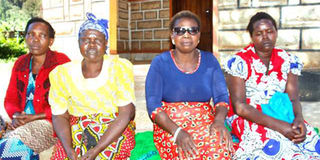Widows fight customs, biased laws denying them share of family wealth

Come-together Widows and Orphans Organisation chairperson Violet Kobia (second right) with other members during the interview. A majority of the organisation’s 3,000 members are battling land-related problems. PHOTO | DAVID MUCHUI | NATION MEDIA GROUP
What you need to know:
- In Meru County and elsewhere, thousands of widows are at the mercy of ruthless in-laws and corrupt government officers.
- Human Rights Watch cites discriminatory laws and customs as some of the factors that continue to fuel the violation of women’s property rights in Kenya.
- Igembe Central MP Kubai Iringo has raised concerns on the high number of disinherited widows in his constituency.
When Violet Kobia lost her husband in 2000, the Eastern provincial commissioner and the International Federation of Women Lawyers (Fida) had to intervene for her to get a share of her dead husband’s land. This was after her in-laws in Igembe North, Meru County, ganged up against her.
“I went to Fida, who referred me to the PC for assistance. He gave me a letter addressed to the district commissioner with instructions that I get justice but it was trashed by the DC’s secretary.
“I went back to the PC’s office where he called the DC on phone and ordered him to address my problem. After a long struggle, I got a share of the land. My late brother-in-law’s wives also benefited in the process,” Ms Kobia recounts.
RUTHLESS OFFICERS
Her experience is one that most widows can relate with. In Meru County and elsewhere, thousands of widows are at the mercy of ruthless in-laws and corrupt government officers.
Many of them are grappling with a double tragedy — losing a husband and his property as well.
While the Succession Act is clear on identification of the rightful claimant to a dead person’s property and the process of transferring the property, retrogressive cultural practices, ignorance and corruption have left many widows landless.
Human Rights Watch cites discriminatory laws and customs as some of the factors that continue to fuel the violation of women’s property rights in Kenya.
“A number of statutes have discriminatory elements. The Law of Succession Act provides that a widow’s inheritance rights are terminated upon remarriage but widowers’ inheritance rights do not terminate upon remarriage,” Human Rights Watch says.
Ms Kobia, who founded the Come-together Widows and Orphans organisation to advocate for their rights, says out of about 3,000 members, 90 per cent have land-related problems.
LACK KNOWLEDGE
“I realised that many widows lacked the knowledge I had when I was pursuing my husband’s land. Many women have been rendered homeless and poor because of land disputes. They cannot get land at their husbands’ home, neither can they get it at their fathers’,” she says, adding that widows are vulnerable due to poverty, ignorance and stigma.
“Men who would want to help fear rumours may start swirling that they have moved in with the woman,” Ms Kobia says.
She is among several widows who shared harrowing experiences of suffering due to corruption among administrators, lands officers and heartless in-laws. Ms Kobia cites intimidation, especially where a lone widow faces off with a crowd of in-laws at meetings meant to share property.
Igembe Central MP Kubai Iringo has raised concerns on the high number of disinherited widows in his constituency.
“The succession process is very hectic and about 3,000 women cannot own land whose title deeds are in their late husbands’ names.
The government should consider waiving fees and come up with a crash programme to settle the backlog,” Mr Iringo said.
Nyambene Widows Organisation programme officer Joseph Mutia says the widow’s fate is sealed from the moment the burial permit is signed and death certificate issued.
DEATH CERTIFICATE
“Unscrupulous in-laws move with speed to ensure they secure the death certificate, which is required in the succession process. They then ensure the widow is sidelined by the system,” Mr Mutia said.
According to Inua Mama Mjane, a non-governmental organisation, there are about 90,000 widows in Meru County grappling with succession challenges.
“Most widows are living on land that has not undergone succession due to interference by in-laws and inefficiencies in the lands office. We are currently assisting 20 women through Fida),” Inua Mama Mjane director Cynthia Kananu said.
In Igembe Central, Jiko Widows and Widowers Self-help Group chairperson Lucy Gitaari says corrupt government officers are to blame for land ownership woes.
Ms Gitaari said a majority of the 1,000 members in her group were grappling with land problems.
Igembe North Deputy County Commissioner Charles Langat refutes claims that land problems affecting widows are widespread.
“There is nothing extraordinary in Igembe North. The only major challenge here is leasing of miraa farms but this will be addressed by the proposed miraa regulations,” Mr Langat said.





